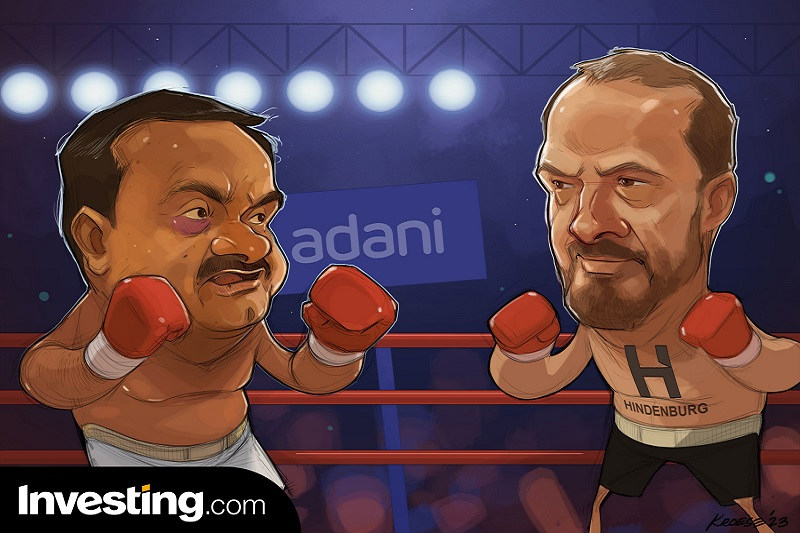By Geoffrey Smith
Investing.com -- It’s a moment of truth for India’s capital markets, and perhaps its whole growth model.
Gautam Adani, on paper Asia’s richest man until last week, stands accused of “the largest con in corporate history,” using extreme leverage and a network of offshore shell companies to manipulate the value of his group companies higher.
Adani, naturally, disputes the allegations, but the accuser - Nathan Anderson’s short-selling firm Hindenburg Research - has a good enough record in identifying corporate frauds (think Nikola and Lordstown Motors) to make the world sit up and take notice.
And take notice it has. Over $100 billion has been wiped off the market value of the billionaire’s flagship holding company Adani Enterprises (NS:ADEL) and its listed affiliates, the Reserve Bank of India is reportedly checking for systemic risk, asking banks to report their exposures to the group, while parliament was shut down amid unruly scenes after the government refused an opposition demand for a debate into the affair, fearing embarrassment for Prime Minister Narendra Modi. Adani has made his fortune by borrowing heavily to develop sectors prioritized by Modi's ambitious growth agenda, notably in the fields of energy and transport.
The volatility in markets has been enough to derail a $2.4 billion share offering planned by Adani Enterprises that might have addressed some of Hindenburg’s concerns about excessive debt had it gone ahead (albeit at a price Hindenburg would call criminally manipulated).
The result of that cancellation was to knock Adani Enterprises stock down by another 25% in trading in Mumbai on Thursday, bringing its total losses since Hindenburg published to nearly 60%.
But it is the debt markets that will decide what happens next. Bonds have hard repayment dates, and a key element of Hindenburg’s findings was that five out of seven listed Adani companies have a current ratio of less than one – that is, they don’t have enough cash and liquid assets to cover debts that will fall due over the next year.
Four of the seven also have negative free cash flow, meaning that their situation is getting worse.
A default on any of the portfolio companies’ bonds could have potentially fatal knock-on effects for affiliates’ debt.
What happens to their debts now isn’t clear, but the stock market action suggests locals think the losses will be absorbed by the finance houses that have lent heavily to Adani in recent years. Aside from Adani’s own companies, some of the biggest losers in the last week have been State Bank of India (NS:SBI), with an estimated $2 billion exposure, and insurance company HDFC Life (NS:HDFL).
Bloomberg reported on Thursday that the wealth management operations of Credit Suisse and Citigroup have stopped accepting Adani-related bonds as collateral for loans to their clients. Other reports suggested that Adani himself was in talks to accelerate the payment of stocks pledged as collateral in a measure aimed at shoring up confidence.
Unfortunately, much of the rest of Adani’s response has had the opposite effect. Its 413-page response to Hindenburg’s questions was short on answers and long on smokescreens.
Tellingly, it appealed to the Indian financial and political establishment for support, with a none-too-subtle warning about the dangers of not sticking together, calling Hindenburg's report "not merely an unwarranted attack on any specific company but a calculated attack on India, the independence, integrity, and quality of Indian institutions, and the growth story and ambition of India.”
When companies start wrapping themselves in the flag, and conflating their own fortunes with their country’s, that is almost always a tell-tale sign of weakness. In truth, this is not so much an attack on India as a vitally important test case for it. It cannot allow its institutions to use prejudice and favoritism to defend something that may not be worth defending.
If Adani is right that its cash flows are sound and its prospects even better, then the truth will out, its stocks and bonds will rebound and Hindenburg – along with anybody else who blindly follows its lead without doing their own research - will lose money.
If, however, Adani has overstretched itself, then the best thing for India’s financial reputation – and its long-term ability to attract capital – is to restructure its debts promptly and transparently, even at the price of some bankers’ and politicians’ careers.
India should heed the lessons from German payments company Wirecard: its ultimate collapse disgraced Germany’s financial regulators, stock exchange executives, bankers, and media all the more thoroughly because they had allowed themselves to fall for a false narrative of evil foreigners beating up a plucky local success story.
As Hindenburg itself points out: “India is a vibrant democracy and an emerging superpower with an exciting future.”
A transparent and just resolution of Adani’s problems could go a long way to giving India a capital market worthy of that status.
